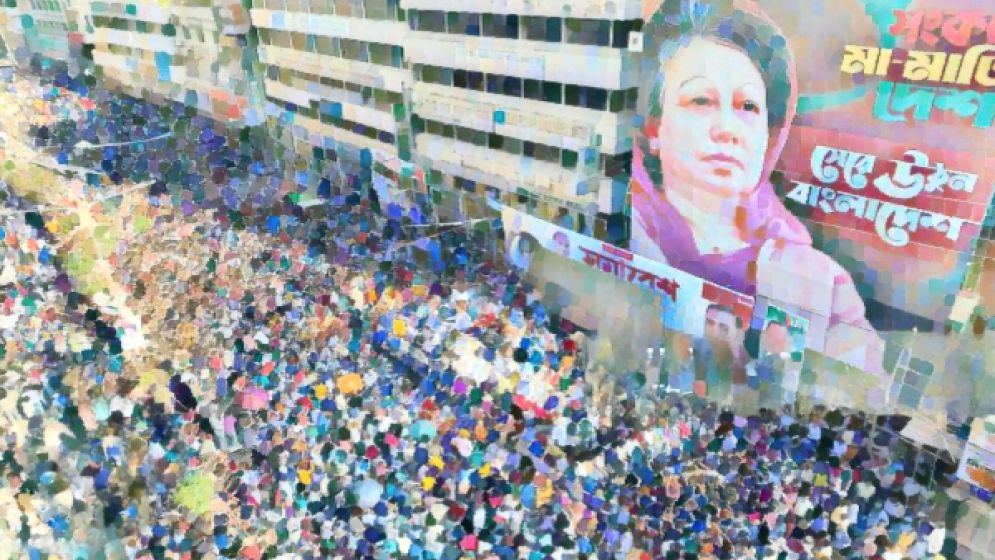BNP charts a solid path to economic revival and trillion-dollar future

Bangladesh stands at a critical juncture. The nation's economic landscape is increasingly precarious, marred by inflationary pressures, dwindling foreign reserves, stagnant investment, and rising unemployment.
This is a profound challenge that demands decisive leadership and a clear vision for the future.
Amidst this backdrop, the Bangladesh Nationalist Party (BNP) offers a comprehensive policy agenda to steer the nation out of this crisis and toward long-term prosperity.
The BNP's vision is clear and grounded in a data-driven framework: to restore macroeconomic stability, build institutional integrity, and propel Bangladesh toward becoming a trillion-dollar economy by 2035.
The BNP's credibility in economic management isn't theoretical; it's drawn from a proven track record. Under the leadership of President Ziaur Rahman, Bangladesh transitioned from a state-controlled economy to one rooted in private enterprise and market liberalization.
His administration laid the foundations for investment protection, financial sector reforms, and rural development, setting the stage for future growth.
The party’s first full democratic tenure under Prime Minister Khaleda Zia from 1991 to 1996 marked Bangladesh's return to parliamentary democracy and witnessed major socioeconomic strides.
The Ready-Made Garments (RMG) sector, now the backbone of the export economy, flourished under BNP's policies. During this period, remittance flows doubled, Export Processing Zones (EPZs) were expanded, and GDP grew by nearly 50%.
Inflation declined, and significant progress was made in women's empowerment through employment.
The BNP's second term in power (2001–2006) further entrenched Bangladesh's economic growth trajectory. GDP rose by 33%, per capita income increased substantially, and industrial output accelerated.
Foreign Direct Investment (FDI) increased nearly fivefold, demonstrating strong investor confidence. While inflation posed challenges, unemployment remained stable, and robust reforms positioned Bangladesh as an emerging player in regional trade.
These results were achieved through a combination of sound fiscal policy, openness to global markets, and a clear commitment to governance reforms.

A strong government
Bangladesh deserves a government that can navigate these stormy economic waters with experience and foresight.
The BNP believes its legacy of economic reform and democratic accountability provides the blueprint for a more stable and prosperous future for all Bangladeshis.
Today, Bangladesh's economy faces one of its most critical challenges in recent memory. The alarm bells are ringing: inflation has surged to 10%, eroding real incomes and heightening inequality.
Foreign exchange reserves have plummeted by 44%, from $46.4 billion in 2020–21 to just $26.2 billion in 2024–25. Foreign Direct Investment (FDI) has stagnated below $2 billion, and unemployment, particularly among youth, continues to rise.
BNP has correctly diagnosed these issues as the consequences of years of misrule, economic mismanagement, and systemic corruption by the incumbent regime. Our criticism isn't rooted in partisanship alone; it's supported by empirical trends that reflect weakening institutions, manipulated economic data, and unsustainable debt growth.
To confront these daunting challenges, the BNP has laid out a detailed roadmap built on pragmatic economic principles. In the short term, we propose a blend of monetary and fiscal measures to tame inflation without stifling growth.
This includes carefully managing interest rates and credit expansion, while restoring fiscal discipline to avoid further monetization of deficits. Critically, we recognize that inflation in Bangladesh isn't just a monetary issue; it's also driven by extortion, corruption, and logistical mismanagement.
Therefore, our plan includes structural reforms to address inefficiencies in supply chains and reduce illicit financial flows. On foreign reserves, the BNP suggests a three-tiered approach: ensuring a competitive exchange rate, expanding overseas employment through bilateral agreements, and promoting export diversification.
We also recognize the urgent need to revitalize investment flows, both foreign and domestic. Bureaucratic barriers, policy unpredictability, and legal opacity have eroded investor confidence.
The BNP commits to minimizing licensing regimes, simplifying tax structures, and improving infrastructure in Export Processing Zones (EPZs) and Special Economic Zones (SEZs) to rebuild investor trust and boost productivity.
Addressing unemployment is another key pillar of the BNP’s economic vision. We'll prioritize short-term capital injections into Small and Medium-sized Enterprises (SMEs), especially those that create local jobs.
Medium-term strategies include vocational training, education reform, and industry-linked skill development.
Long-term, we'll identify new industries where Bangladesh has a comparative advantage, particularly in services and value-added manufacturing, to generate sustainable employment.
BNP also recognizes the critical need for responsible debt management. The nation's external debt has exceeded $100 billion, threatening fiscal stability. We propose auditing all recent borrowing to ensure compliance with international standards of responsible lending and, if necessary, seeking restructuring.
Unlike the current regime, which has allowed debt to spiral with little transparency, the BNP pledges to manage public finances with discipline and openness.

Plans rooted in ground reality
Our economic framework also responds to Bangladesh’s impending graduation from Least Developed Country (LDC) status in 2026.
While Bangladesh meets the Gross National Income (GNI) and Human Assets Index (HAI) thresholds, it remains vulnerable on the Economic and Environmental Vulnerability Index (EVI).
BNP raises serious concerns about the manipulation of economic data by the previous regime–specifically GDP figures, export statistics, and population data–which has painted an artificially rosy picture.
By committing to independent data validation and transparency, the BNP aims to restore the credibility of national statistics and international trust in Bangladesh’s economic governance.
Looking ahead, the BNP offers a bold and visionary economic target: achieving a trillion-dollar economy by 2034.
This goal is grounded in rigorous macroeconomic modeling and supported by achievable reforms. It's time for Bangladesh to choose a path of transparency, accountability, and sustainable growth.
In a departure from the current economic stagnation, the BNP has set clear quantitative and policy targets designed to revitalize the nation.
We aim to create 10 million new jobs within the first 18 months of government, significantly increase the FDI-to-GDP ratio from 0.45% to 2.5%, and dramatically expand the tax base without increasing fear or burden on citizens.
Our strategy includes a complete overhaul of anti-growth tax policies, aggressive promotion of manpower export, and the transformation of Export Processing Zones (EPZs) and high-tech parks into globally competitive hubs.
BNP’s transformative vision is not simply aspirational; it is rooted in the party’s historical performance and a deep understanding of Bangladesh’s structural constraints.
At the heart of our roadmap is an unwavering commitment to good governance, transparency, and institutional revival. We recognize that economic growth must be inclusive, sustainable, and rule-based.
Our policies reflect a pragmatic approach to restoring macroeconomic balance, reducing inequality, and creating jobs for the millions of young Bangladeshis entering the labor market.
The BNP’s economic blueprint offers the nation a credible, forward-looking alternative rooted in experience, data, and a clear vision for structural transformation.
As Bangladesh navigates one of the most uncertain periods in its economic history, the BNP’s roadmap stands as a testament to what focused leadership, disciplined governance, and visionary policymaking can achieve.
The time has come to reclaim the promise of Bangladesh—and the BNP is prepared to lead the way.
—
Md Jobayer Hossain is the Country Coordinator (Malaysia & Singapore), Amnesty International UK. He can be reached at [email protected]

